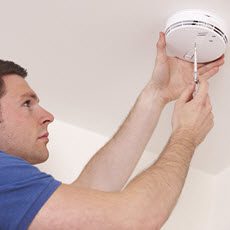
What is Carbon Monoxide?
Carbon Monoxide or CO is found in fumes produced any time you burn fuel in cars or trucks, small engines, stoves, lanterns, grills, fireplaces, gas ranges, or furnaces. CO can build up indoors and poison people and animals who breathe it.
Why is it called the invisible killer?
CO is a colorless, odorless, and poisonous gas. Each year, nearly 500 Americans die from unintentional CO poisoning not linked to fires, more than 20,000 visit the emergency room, and more than 4,000 are hospitalized.
Why be concerned now?
As outside temperatures are dipping under freezing, people turn on their heating systems and mistakenly warm their cars in garages. This time of the year becomes prime time for CO poisoning. As the weather turns colder, it’s important to take extra precautions.
What can I do to reduce my risk of CO poisoning?
The National Safety Council recommends you install a battery-operated or battery backup carbon monoxide detector in the hallway near each separate sleeping area in your home. Check or replace the battery when you change the time on your clocks each spring and fall and replace the detector every five years.
In addition to dectors, you can also take some simple steps …
- Have your furnace, water heater and any other gas or coal-burning appliances serviced by a qualified technician every year
- Do not use portable flameless chemical heaters indoors
- Have your chimney checked and cleaned every year, and make sure your fireplace damper is open before lighting a fire and well after the fire is extinguished
- Never use a gas oven for heating your home
- Never use a generator inside your home, basement or garage or less than 20 feet from any window, door or vent; fatal levels of carbon monoxide can be produced in just minutes, even if doors and windows are open
- Never run a car in a garage that is attached to a house, even with the garage door open; always open the door to a detached garage to let in fresh air when you run a car inside
What are the symptoms of CO poisoning?
The initial symptoms of low to moderate CO poisoning are similar to the flu (but without the fever). They include headache, fatigue, shortness of breath, nausea, dizziness
High level CO poisoning results in progressively more severe symptoms, including mental confusion, vomiting, loss of muscular coordination, loss of consciousness, ultimately death. People who are sleeping or drunk can die from CO poisoning before they have symptoms
What should I do if my CO alarm begins beeping?
If you hear your carbon monoxide detector beeping, do not ignore the alarm. Many potential victims were worried about “bothering” first responders but that is what they are there for. Leave immediately. Exposure can quickly lead to health risks including heart disease or fatality. Get pets and everyone out for fresh air. Call your emergency services, fire department or 9-1-1. If you have any symptoms, go to the emergency room. Do not re-enter the home until emergency responders say it’s safe to do so. If the source of the CO is determined to be a malfunctioning appliance, DO NOT operate that appliance until it has been properly serviced by trained personnel.
If local emergency responders don’t find carbon monoxide in your home, try resetting your alarm. If the detector doesn’t stop beeping, contact your manufacturer immediately.
What should I do if I am experiencing symptoms of CO poisoning and do not have a CO alarm, or my CO alarm is not going off?
If you think you are experiencing any of the symptoms of CO poisoning, get outside to fresh air immediately. Leave the home and call your fire department to report your symptoms. You could lose consciousness and die if you stay in the home. It is also important to contact a doctor immediately for a proper diagnosis. Tell your doctor that you suspect CO poisoning is causing your problems. Prompt medical attention is important if you are experiencing any symptoms of CO poisoning.
CO Poisoning is preventable
Make sure you install your CO detectors and they are running correctly, never run your car in a closed garage and take all recommended precautions.
Below is a link to a brief, informative video by the CDC
